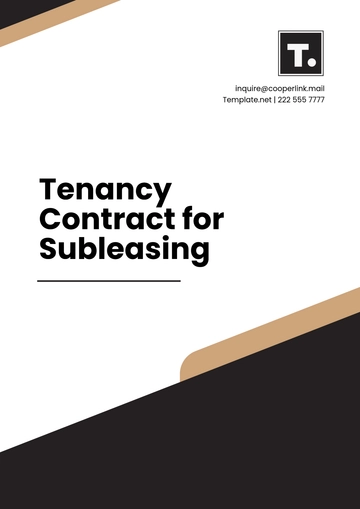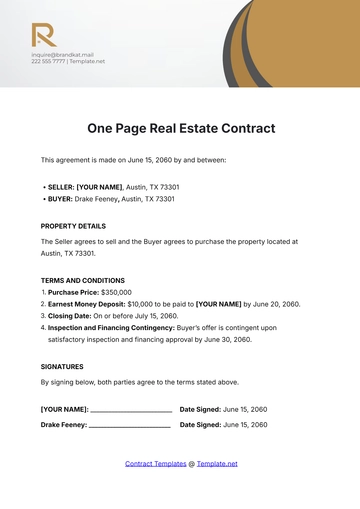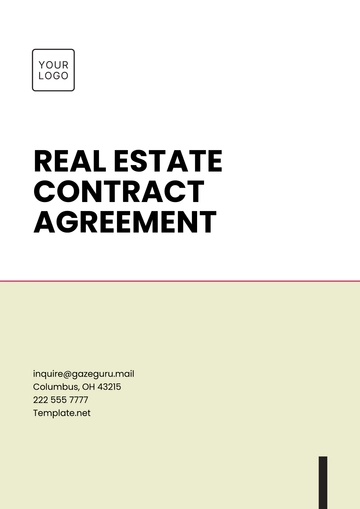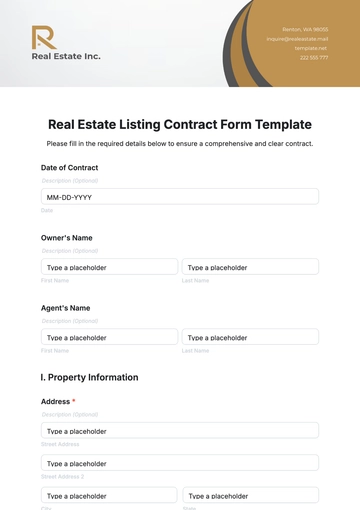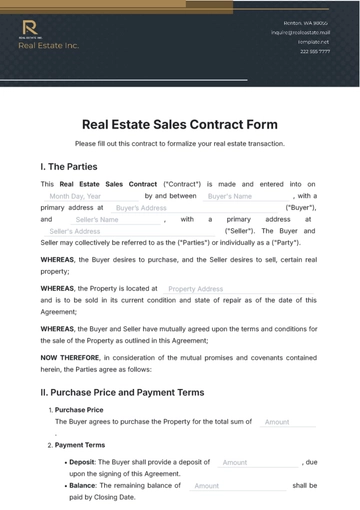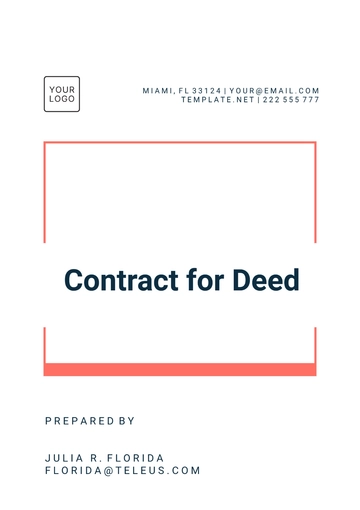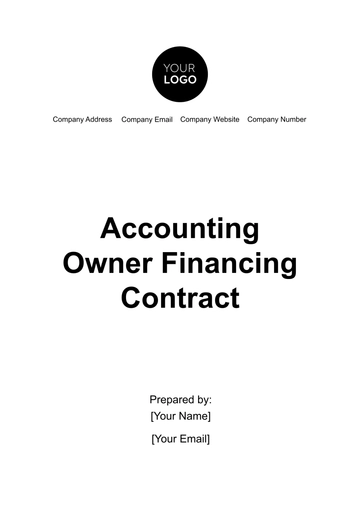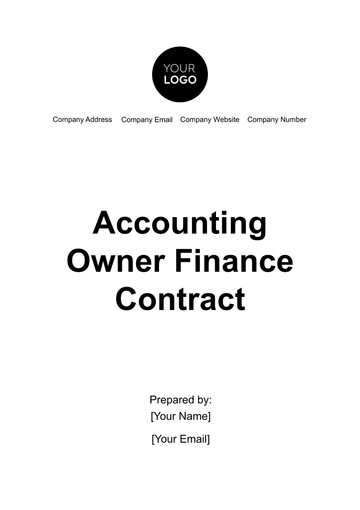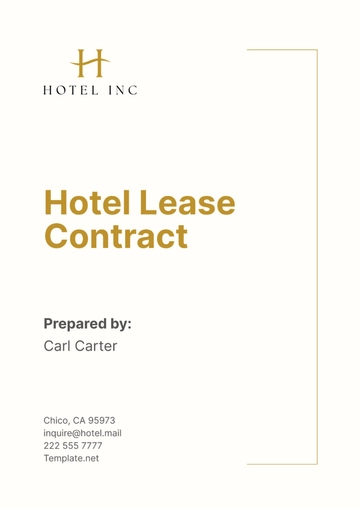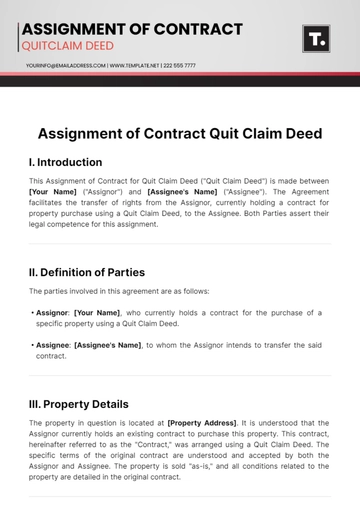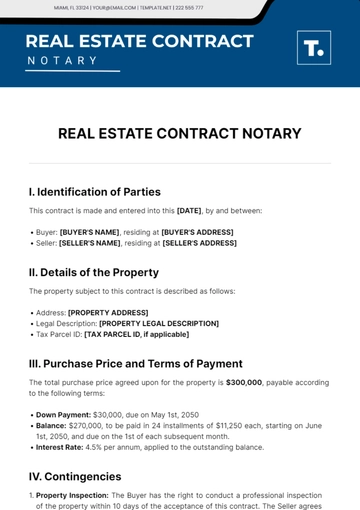Free Real Estate Contract for Deed
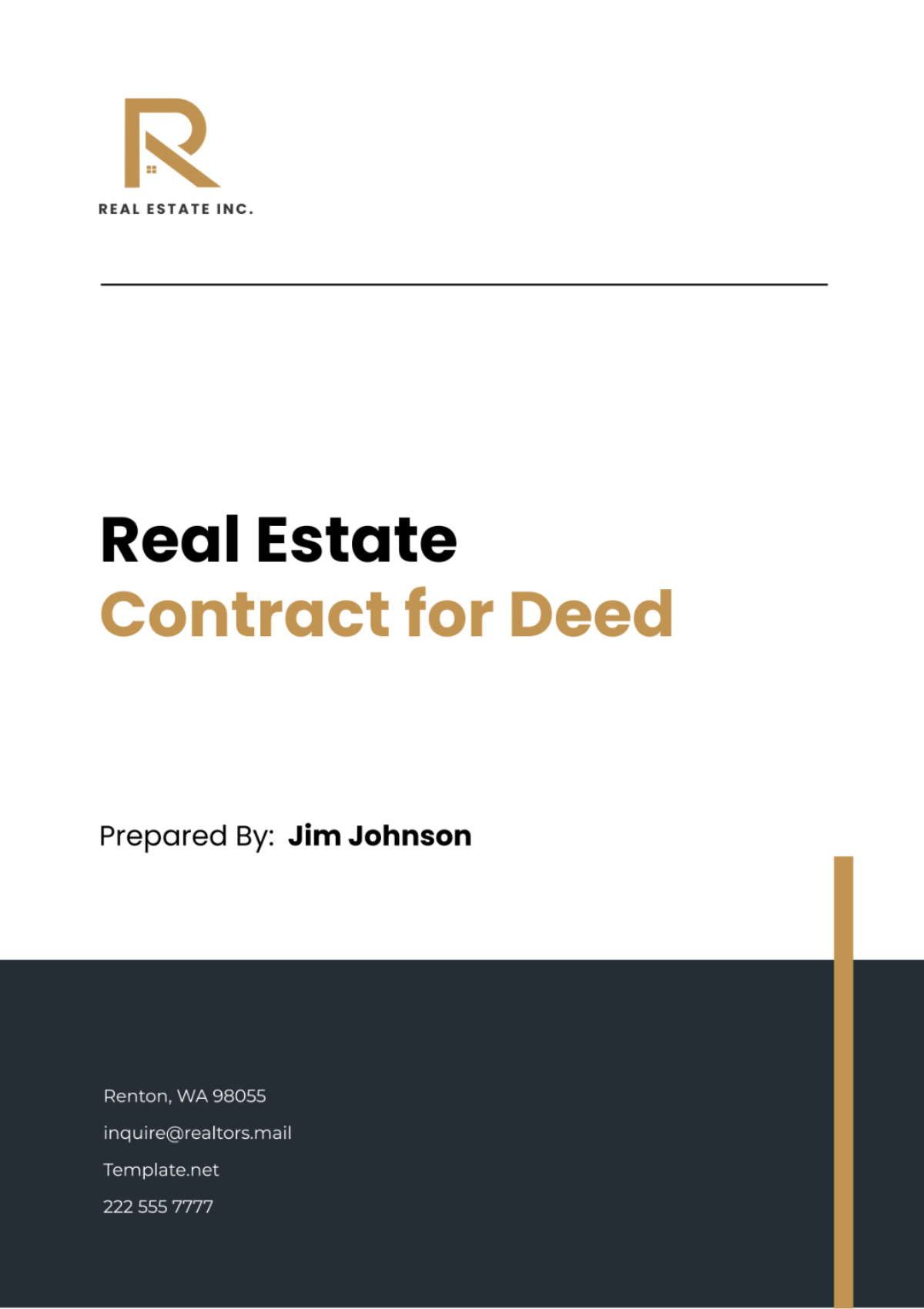
This Real Estate Contract for Deed (the “Contract”) is entered into this [Day of Month, Year] by and between [Your Company Name] having its principal place of business at [Your Company Address] (“Seller”) and [Buyer's Name], residing at [Buyer's Address] (“Buyer”), collectively referred to as the “Parties” and each a “Party”.
WHEREAS, the Seller is the lawful owner of the Property and has the legal right to sell it;
WHEREAS, the Buyer is interested in purchasing the Property and has the financial capability to do so;
WHEREAS, both Parties have agreed to the terms and conditions set forth in this Contract;
NOW THEREFORE, in consideration of the mutual covenants contained herein and for other good and valuable consideration, the receipt and sufficiency of which is hereby acknowledged, the Parties agree as follows:
I. Sale And Purchase Of The Property
A. Description of the Property
The property to be sold under this Contract is referred to as the “Property” or “Real Property”, and is described as follows: “[Lot no., Block no., Subdivision, City, State, Country]”.
The Property includes all buildings, fixtures, and improvements located on the land, including but not limited to, residential buildings, garages, and landscaping.
The Property also includes all rights and benefits associated with the land, including air rights, water rights, and mineral rights, unless otherwise specified in this Contract.
The Property is located in a desirable neighborhood with access to local amenities such as schools, parks, shopping centers, and transportation.
B. Ownership of the Property
The Seller confirms that they are the legal owner of the Property and have the right to sell it.
The Seller also confirms that the Property is free from any liens, encumbrances, or other claims, unless otherwise specified in this Contract.
The Seller will provide the Buyer with proof of ownership and a copy of the title deed upon request.
The Seller will ensure that the title to the Property is transferred to the Buyer upon completion of the payment.
II. Purchase Price And Terms Of Payment
The total purchase price for the Property and the terms of payment are as follows:
A. Total Purchase Price
The total purchase price for the Property shall be the sum of [$500,000].
The purchase price has been agreed upon by both the Seller and the Buyer after considering the current market value of the Property, the condition of the Property, and other relevant factors.
The purchase price includes all taxes and fees associated with the sale of the Property, unless otherwise specified in this Contract.
B. Down Payment
The Buyer will pay a down payment of [$100,000] on [Month Day, Year].
The down payment will be deducted from the total purchase price.
The down payment is non-refundable and will be forfeited if the Buyer fails to complete the purchase, unless otherwise specified in this Contract.
C. Payment Schedule
The balance of [$400,000] will be payable in [120] equal monthly installments of [$3,333.33] each.
The installments will be due on the first day of each month, starting from the month following the payment of the down payment.
If the Buyer fails to make a payment on time, the Seller has the right to terminate the Contract and keep the down payment, unless otherwise specified in this contract.
The Buyer has the right to prepay the balance at any time without penalty, thereby becoming the full owner of the Property sooner.
III. Taxes And Assessments
The Seller and the Buyer agree to handle all real estate taxes and assessments levied on the Property as follows:
A. Responsibility for Taxes and Assessments
All real estate taxes and assessments levied on the Property, which are not yet due and payable, will be evenly divided between Seller and Buyer as of the Close of Escrow. This ensures a fair distribution of financial obligations associated with the Property.
This division of responsibility is based on the understanding that both Parties share the benefits and burdens of the Property until the ownership is officially transferred.
The division will be calculated based on the number of days each Party has ownership of the Property during the tax or assessment period.
Any disputes regarding the division of taxes and assessments will be resolved through negotiation between the Parties, or through mediation if necessary.
If the Parties cannot agree on the division of taxes and assessments, they may choose to involve a neutral third party to make a determination.
B. Seller’s Obligations
The Seller is responsible for all taxes and assessments that are due and payable before the Close of Escrow. This includes any delinquent taxes or assessments.
The Seller will provide proof of payment for these taxes and assessments upon the Buyer’s request. This proof may include receipts, tax bills, or other relevant documents.
The Seller will also provide the Buyer with any information or documentation needed to apply for tax exemptions or credits related to the Property.
If the Seller fails to pay any taxes or assessments that are their responsibility, the Buyer may choose to pay them and deduct the amount from the purchase price.
C. Buyer’s Obligations
The Buyer is responsible for all taxes and assessments that become due and payable after the Close of Escrow. This includes any new assessments levied after the Close of Escrow.
The Buyer will ensure that these taxes and assessments are paid on time to avoid any penalties or interest charges. This is important to prevent any liens or encumbrances being placed on the Property.
The Buyer will provide the Seller with proof of payment for these taxes and assessments upon request. This proof may include receipts, tax bills, or other relevant documents.
The Buyer will also apply for any tax exemptions or credits related to the Property in a timely manner.
If the Buyer fails to pay any taxes or assessments that are their responsibility, the Seller may choose to pay them and add the amount to the balance of the purchase price.
IV. Insurance
The Buyer agrees to maintain adequate insurance coverage on the Property as follows:
A. Insurance Coverage
The Buyer will keep the Property insured against loss by fire and other hazards covered by standard extended coverage insurance. This is to protect the interests of both the Buyer and the Seller.
The insurance coverage will be in an amount not less than the unpaid balance of the purchase price or the replacement cost of the Property, whichever is higher. This ensures that the Seller can recover their investment if the Property is damaged or destroyed.
The Buyer will provide the Seller with proof of insurance upon request. This proof may include a copy of the insurance policy, a certificate of insurance, or a letter from the insurance company.
The Buyer will notify the Seller if the insurance coverage changes or if the insurance policy is cancelled. This is to ensure that the Seller is always aware of the level of protection on the Property.
The Buyer will also notify the Seller if the insurance company denies a claim or if the insurance company goes out of business.
B. Insurance Provider
The Buyer has the freedom to choose any insurance provider as long as the coverage meets the requirements stated in this Contract. This allows the Buyer to shop around for the best rates and coverage.
The Buyer will inform the Seller about the chosen insurance provider and provide contact information for the same. This allows the Seller to verify the coverage and to contact the insurance provider if necessary.
The Buyer will also inform the Seller if they change insurance providers. This is to ensure that the Seller always has up-to-date information.
If the Seller has any concerns about the insurance provider or the coverage, they may discuss these concerns with the Buyer. The Parties will work together to resolve any issues.
C. Changes in Insurance
The Buyer will inform the Seller about any changes in the insurance policy, including changes in coverage, insurance provider, or policy number. This is to ensure that the Seller is always aware of the level of protection on the Property.
The Buyer will ensure that there is no lapse in coverage during the term of this Contract. This is to protect the interests of both the Buyer and the Seller.
If the insurance coverage is insufficient or if there is a lapse in coverage, the Seller may choose to purchase additional coverage and add the cost to the balance of the purchase price.
The Buyer will also inform the Seller if they receive any notices from the insurance company, such as notices of non-renewal or notices of changes in coverage.
V. Default
In the event of default by the Buyer, the Seller has the following options:
A. Consequences of Default
In the event of default by Buyer, Seller may, at its option, declare the entire unpaid balance immediately due and payable. This is a common remedy in real estate contracts to protect the Seller’s interests.
This means that the Buyer will have to pay the entire remaining balance immediately, instead of making scheduled payments. This can be a significant financial burden for the Buyer.
The Seller may also choose to take legal action to enforce the Contract. This could include filing a lawsuit against the Buyer or seeking a court order to take possession of the Property.
The Seller may also report the default to credit reporting agencies, which could negatively affect the Buyer’s credit score.
If the Buyer is unable to pay the entire unpaid balance, the Seller may choose to foreclose on the Property. This would involve selling the Property to recover the unpaid balance.
B. Termination of Contract
The Seller may also choose to terminate the Contract and retain all payments made by the Buyer as liquidated damages. This is another common remedy in real estate contracts. This means that the Buyer will lose all the money they have paid towards the purchase of the Property, and the Seller will retain ownership of the Property.
The Seller may also choose to sell the Property to another buyer. If the Seller sells the Property for more than the unpaid balance, the Seller may refund the excess to the Buyer.
If the Seller sells the Property for less than the unpaid balance, the Buyer may still be responsible for the difference.
C. Enforcement of Contract
If the Seller chooses to enforce the Contract, the Buyer will be responsible for all costs and expenses, including attorney’s fees, incurred by the Seller. This means that the Buyer will have to pay for the Seller’s legal expenses in addition to their own if the matter goes to court.
The Seller may also be entitled to interest on the unpaid balance from the date of default until the date of payment.
The Seller may also be entitled to damages for any loss in value of the Property or for any other losses caused by the Buyer’s default.
The Seller may also have the right to take possession of the Property until the unpaid balance is paid in full.
D. Notice of Default
The Seller will provide the Buyer with a written notice of default, giving the Buyer a chance to rectify the situation before further action is taken.
The notice will specify the nature of the default and the steps the Buyer needs to take to remedy the default.
The notice will also specify a deadline for the Buyer to remedy the default. If the Buyer fails to remedy the default by the deadline, the Seller may proceed with the remedies outlined in this section.
The notice will be sent to the Buyer’s last known address by certified mail, return receipt requested. This ensures that the Buyer receives the notice and is aware of the default.
The Seller may also choose to deliver the notice in person or by any other method allowed by law.
E. Remedies
The remedies provided in this section are not exclusive, and the Seller may have other remedies available under law.
The Seller’s decision to pursue one remedy does not preclude them from pursuing other remedies.
The Seller may choose to pursue multiple remedies simultaneously or consecutively, as long as they do not double recover for the same loss.
The Seller may also choose to waive one or more remedies, but this does not constitute a waiver of any other remedies.
The Seller may also choose to delay enforcing their remedies, but this does not constitute a waiver of their rights.
The Seller’s remedies may include, but are not limited to, specific performance, rescission, reformation, restitution, and damages.
VI. No First Mortgage Lien
The Seller confirms that their title to the Property is free from any first mortgage lien, with the following details:
A. Seller’s Title
The Seller’s title to the Property is free and clear of all liens except for the lien of current, non-delinquent real property taxes and assessments. This means that there are no other mortgages, loans, or other financial encumbrances on the Property that would take precedence over the Buyer’s rights.
The Seller has either paid off any previous mortgages or loans on the Property, or will use the proceeds from the sale to pay them off before the Close of Escrow. This ensures that the Buyer will receive a clear title to the Property.
The Seller will provide the Buyer with a title insurance policy or other suitable assurance to confirm that the title is free and clear, except for the current taxes and assessments. This gives the Buyer peace of mind that they are getting a clear title to the Property.
If any other liens or encumbrances are discovered, the Seller will be responsible for clearing them before the Close of Escrow. This protects the Buyer from any unexpected financial obligations related to the Property.
If the Seller is unable to clear any other liens or encumbrances, the Buyer may choose to cancel the Contract and receive a full refund of their down payment. This provides the Buyer with a way out of the Contract if the Seller cannot deliver a clear title.
B. Current Taxes and Assessments
The only exception to the clear title is the lien of current, non-delinquent real property taxes and assessments. These are ongoing charges that are associated with owning real estate, and they are typically paid on an annual basis.
As stated in Section III, these taxes and assessments will be divided evenly between the Seller and the Buyer as of the Close of Escrow. This ensures a fair distribution of financial obligations associated with the Property.
The Seller is responsible for paying any taxes and assessments that are due before the Close of Escrow. This ensures that the Buyer is not responsible for any past due taxes or assessments.
The Buyer is responsible for paying any taxes and assessments that become due after the Close of Escrow. This ensures that the Seller is not responsible for any future taxes or assessments after they no longer own the Property.
C. Assurance of Clear Title
The Seller will provide the Buyer with a title insurance policy or other suitable assurance to confirm that the title is free and clear, except for the current taxes and assessments. This gives the Buyer peace of mind that they are getting a clear title to the Property.
The title insurance policy will protect the Buyer against any losses resulting from defects in the title that were not known at the time of the sale. This includes any liens or encumbrances that were not discovered during the title search.
The Seller will pay for the cost of the title insurance policy. This is a common practice in real estate transactions and is usually included in the closing costs.
If any issues are discovered after the sale, the title insurance company will either fix the issues or compensate the Buyer for their loss. This protects the Buyer from any unexpected issues with the title.
The Seller will also provide the Buyer with a warranty deed at the closing. This is a legal document that guarantees that the Seller owns the Property and has the right to sell it.
VII. Governing Law
This Contract will be governed by and interpreted in accordance with the laws of a specific jurisdiction:
A. Choice of Law
This Contract will be governed by and construed in accordance with the laws of [State Name]. Any disputes or issues that arise out of this Contract will be resolved according to the laws of [State Name], regardless of where the Parties reside or where the Property is located.
B. Jurisdiction
The Parties agree that any legal action related to this Contract will be brought in the courts of [State Name]. This ensures that the same laws are applied consistently throughout the duration of the Contract.
C. Compliance with Local Laws
The Parties will comply with all applicable laws and regulations of [State Name] in performing their obligations under this Contract. This includes, but is not limited to, laws related to real estate transactions, consumer protection, and data privacy.
VIII. Entire Agreement
This Contract, including any exhibits attached hereto and made part hereof, constitutes the entire agreement between the Parties:
A. Completeness of the Contract
This Contract, including any exhibits attached hereto and made part hereof, constitutes the entire agreement between the Parties. This means that all terms and conditions agreed upon by the Parties are contained within this Contract, and there are no other agreements or understandings, whether written or oral, that affect this Contract.
The Parties have negotiated the terms of this Contract in good faith, and they believe that this Contract represents a fair and equitable agreement. This means that the Parties have had the opportunity to discuss and negotiate every term and condition in this Contract.
The Parties have each been represented by legal counsel, or have had the opportunity to consult with legal counsel, in the negotiation and execution of this Contract. This means that the Parties understand the legal implications of this Contract and have made an informed decision to enter into this Contract.
B. Supersedes Previous Agreements
This Contract supersedes any previous agreements or negotiations between the Parties related to the sale of the Property. This means that any previous agreements or negotiations are no longer valid and cannot be used to interpret or modify this Contract.
If there is any conflict between this Contract and any previous agreements, the terms of this Contract will prevail. This ensures that the Parties are bound by the most recent agreement that they have signed.
The Parties have each had the opportunity to review this Contract and any previous agreements, and they have chosen to enter into this Contract because they believe it is in their best interest. This means that the Parties have made a conscious decision to replace any previous agreements with this Contract.
C. Amendments
Any amendments to this Contract must be in writing and signed by both Parties. This ensures that any changes to the Contract are clearly documented and agreed upon by both Parties.
The Parties will negotiate any amendments in good faith, and they will not unreasonably withhold their consent to any proposed amendments. This ensures that the Contract can be modified as necessary to reflect changes in circumstances or to correct any errors or omissions.
Any amendments will become part of this Contract and will be subject to all the terms and conditions of this Contract. This means that any amendments will be governed by the same laws and will be enforced in the same way as the rest of the Contract.
IX. Signatures
IN WITNESS WHEREOF, this Contract has been executed by the Parties as of the date first above written.
Seller

[Authorized Representative Name]
[Your Company Name]
Date: [Month Day, Year]
Buyer

[Buyer's Name]
Date: [Month Day, Year]
- 100% Customizable, free editor
- Access 1 Million+ Templates, photo’s & graphics
- Download or share as a template
- Click and replace photos, graphics, text, backgrounds
- Resize, crop, AI write & more
- Access advanced editor
Handle your real estate transactions professionally and legally with our Real Estate Contract for Deed Template! This fully editable and customizable contract available only on Template.net ensures you include every important section. The AI Editor Tool makes editing seamless allowing you to provide a clear and tailored contract for deeds!
You may also like
- Rental Contract
- Contractor Contract
- Contract Agreement
- One Page Contract
- School Contract
- Social Media Contract
- Service Contract
- Business Contract
- Restaurant Contract
- Marketing Contract
- Real Estate Contract
- IT Contract
- Cleaning Contract
- Property Contract
- Supplier Contract
- Partnership Contract
- Food Business Contract
- Construction Contract
- Employment Contract
- Investment Contract
- Project Contract
- Payment Contract
- Student Contract
- Travel Agency Contract
- Startup Contract
- Annual Maintenance Contract
- Employee Contract
- Gym Contract
- Event Planning Contract
- Personal Contract
- Nursing Home Contract
- Law Firm Contract
- Work from Home Contract
- Software Development Contract
- Maintenance Contract
- Music Contract
- Amendment Contract
- Band Contract
- DJ Contract
- University Contract
- Salon Contract
- Renovation Contract
- Photography Contract
- Lawn Care Contract



